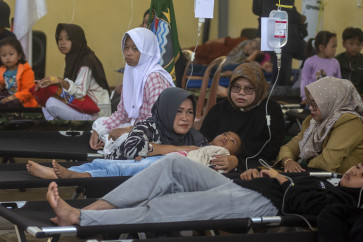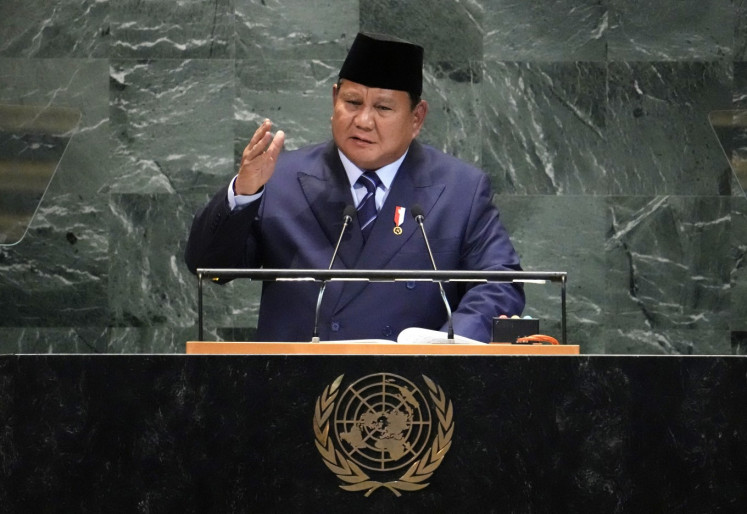Popular Reads
Top Results
Can't find what you're looking for?
View all search resultsPopular Reads
Top Results
Can't find what you're looking for?
View all search results40 plantations get 'green' certificates
Agro talk: Agriculture Minister Suswono (left), Environment Minister Balthasar Kambuaya (third left), Indonesian Chamber of Commerce and Industry (Kadin) deputy chairman for agribusiness and food Franky Oesman Widjaja (second right) and Forestry Minister Zulfikli Hasan (right) look at a oil palm seed display during the International Conference on Oil Palm and Environment (ICOPE) in Kuta, Bali, on Wednesday
Change text size
Gift Premium Articles
to Anyone
 Agro talk: Agriculture Minister Suswono (left), Environment Minister Balthasar Kambuaya (third left), Indonesian Chamber of Commerce and Industry (Kadin) deputy chairman for agribusiness and food Franky Oesman Widjaja (second right) and Forestry Minister Zulfikli Hasan (right) look at a oil palm seed display during the International Conference on Oil Palm and Environment (ICOPE) in Kuta, Bali, on Wednesday. The biennial event was attended by 400 participants from 20 countries. (Antara/Nyoman Budhiana) (left), Environment Minister Balthasar Kambuaya (third left), Indonesian Chamber of Commerce and Industry (Kadin) deputy chairman for agribusiness and food Franky Oesman Widjaja (second right) and Forestry Minister Zulfikli Hasan (right) look at a oil palm seed display during the International Conference on Oil Palm and Environment (ICOPE) in Kuta, Bali, on Wednesday. The biennial event was attended by 400 participants from 20 countries. (Antara/Nyoman Budhiana)
Agro talk: Agriculture Minister Suswono (left), Environment Minister Balthasar Kambuaya (third left), Indonesian Chamber of Commerce and Industry (Kadin) deputy chairman for agribusiness and food Franky Oesman Widjaja (second right) and Forestry Minister Zulfikli Hasan (right) look at a oil palm seed display during the International Conference on Oil Palm and Environment (ICOPE) in Kuta, Bali, on Wednesday. The biennial event was attended by 400 participants from 20 countries. (Antara/Nyoman Budhiana) (left), Environment Minister Balthasar Kambuaya (third left), Indonesian Chamber of Commerce and Industry (Kadin) deputy chairman for agribusiness and food Franky Oesman Widjaja (second right) and Forestry Minister Zulfikli Hasan (right) look at a oil palm seed display during the International Conference on Oil Palm and Environment (ICOPE) in Kuta, Bali, on Wednesday. The biennial event was attended by 400 participants from 20 countries. (Antara/Nyoman Budhiana)
A
span class="caption" style="width: 498px;">Agro talk: Agriculture Minister Suswono (left), Environment Minister Balthasar Kambuaya (third left), Indonesian Chamber of Commerce and Industry (Kadin) deputy chairman for agribusiness and food Franky Oesman Widjaja (second right) and Forestry Minister Zulfikli Hasan (right) look at a oil palm seed display during the International Conference on Oil Palm and Environment (ICOPE) in Kuta, Bali, on Wednesday. The biennial event was attended by 400 participants from 20 countries. (Antara/Nyoman Budhiana)
Being the world's largest palm-oil producer, Indonesia has tried to convince global consumers that its agricultural products are grown and cultivated through sustainable processes.
To demonstrate its sustainability-approach commitment, in 2011 the government introduced the Indonesia Sustainable Palm Oil (ISPO) certification to be granted to plantation companies that have followed the procedures accordingly.
So far, the Agriculture Ministry has granted 40 oil-palm plantations the 'green' certificates and expects to see more companies obtain the certification.
'We have issued 40 certificates so far and are in the midst of auditing 73 other plantations,' Agriculture Minister, Suswono, said.
'This means that there are more plantations that have yet to obtain the certificates,' he added.
The ISPO outlines sustainable production practices which oil-palm plantations have to adhere to.
The government has made it mandatory for all oil-palm plantations to obtain the certificate by the end of this year.
The ISPO is the government's solution to the Roundtable on Sustainable Palm Oil (RSPO) certification which similarly promotes sustainable practices. However, participation by oil-palm plantations in that program is voluntary.
Suswono warned that given the compulsory nature all oil palm plantations must get certification this year.
'We must make this plan happen,' he said on the sidelines of the International Conference on Oil Palm and the Environment (ICOPE 2014) in Bali.
The three-day seminar, organized by PT Sinar Mas Agro Resources and Technology (SMART), French research center Cirad and the World Wide Fund for Nature (WWF) Indonesia, has gathered regulators, oil-palm producers as well as observers to discuss sustainable oil-palm cultivation strategies.
SMART Research Institute division head, Jean-Pierre Caliman, said that the ISPO was an 'important initiative' which would 'contribute to increasing the sustainability of oil-palm plantations in Indonesia'.
SMART is one of the largest palm-oil producers to have obtained the ISPO. The listed palm-oil producer booked revenues of Rp 16.7 trillion (US$1.5 billion) in the first nine months of last year, down 20.5 percent year-on-year. Net profits weakened 41.4 percent annually to Rp 864.6 billion.
However, the challenge in conducting the initiative was human resources, Caliman said.
He said there needed to be experts on the ground verifying whether a plantation had met ISPO requirements.
He added that instructors were required to provide education and training on sustainable practices to smallholders.
'This sustainability certificate will elevate all the planters but to do so, someone has to teach them the necessary skills and this calls for greater education and training services,' he said.
He further noted that the government, with the support of large palm-oil companies, should provide the necessary human-resource support for the ISPO.
The government is aiming for crude palm oil (CPO) production of 40 million tons per year by 2020.
Currently, approximately 2 million hectares of smallholder plantations have annual yields of below 2 million tons. Meanwhile, the average national yield is approximately 3.7 million tons per year.









